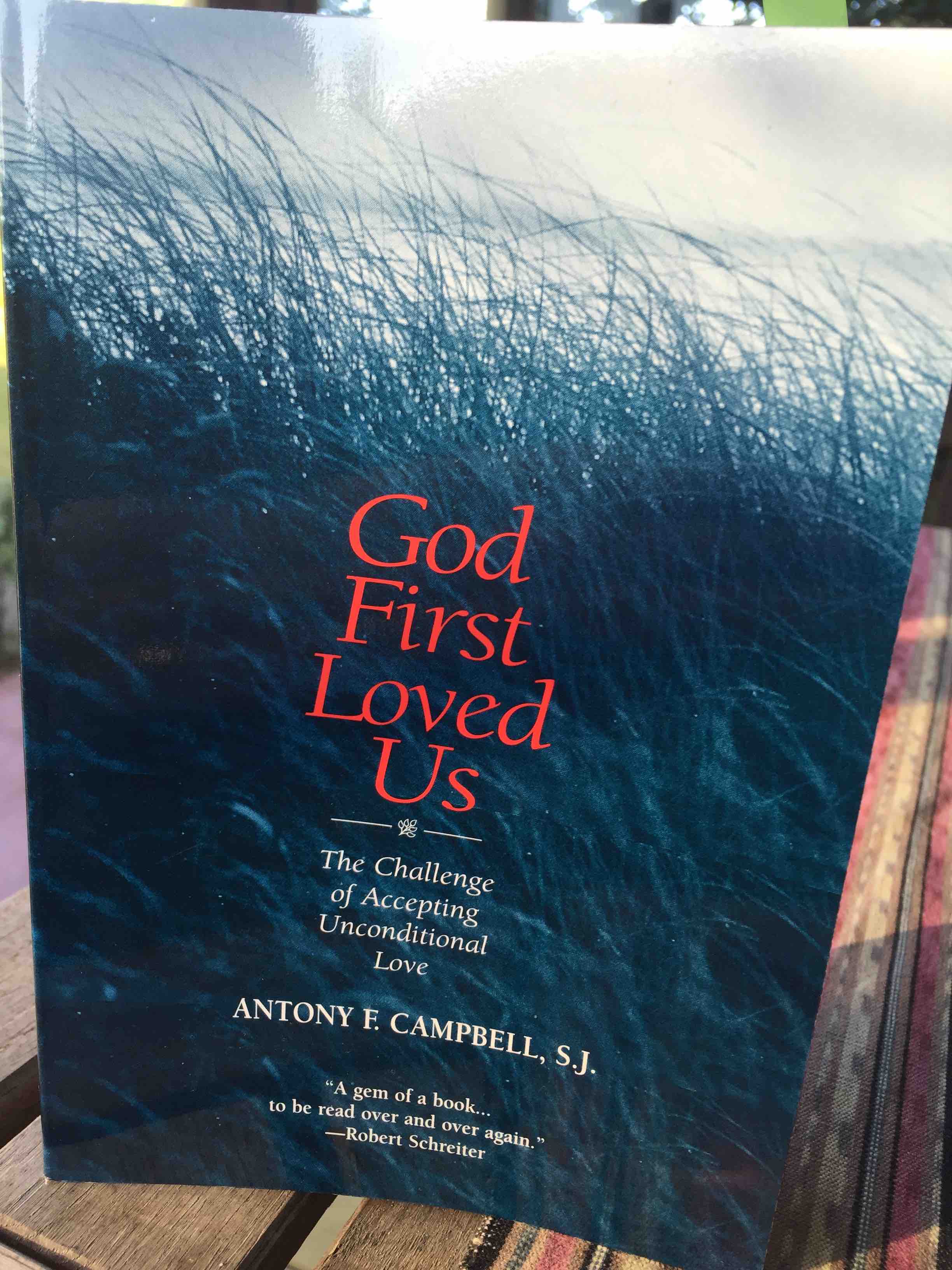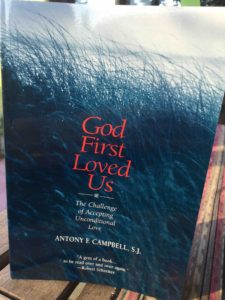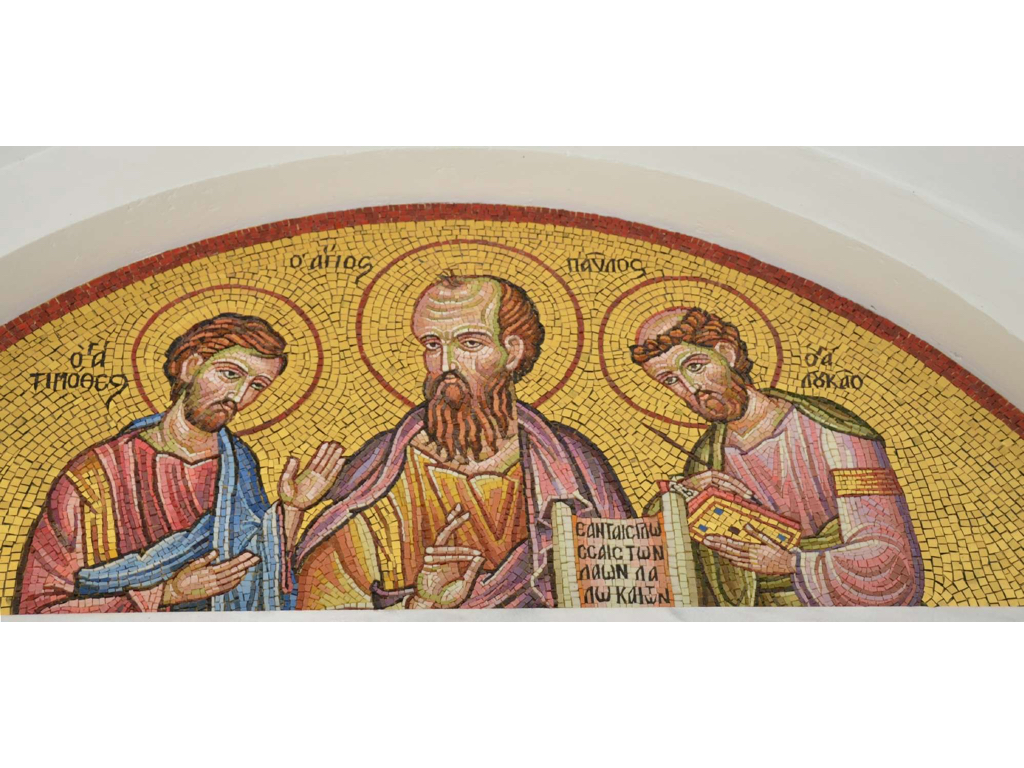A review of “God first loved us: the challenge of accepting unconditional love”, by Antony F. Campbell, S. J.
- Preamble
- Which is primary? God as lover or God as judge? What does the Bible reveal, and how do we see it? The way we answer these questions has profound ramifications personally and collectively.
- Summary
- Campbell argues that since God is interested in relationship above all, we do better to recognise him as lover first and judge second. His argument develops in a little over 100 pages divided into eight chapters, plus an overview and afterword. A devotional reflection on the events of Good Friday concludes the book. Whether you agree with his emphases, you will find much to stimulate a healthy reassessment of your view of God.
- Body of the Book
- If there is a theme scripture to the book it would be, “This is love: not that we loved God, but that he loved us and sent his Son as an atoning sacrifice for our sins…We love because he first loved us.” 1 John 4.10,19 (NIV11). Campbell would have us find our motivation from the prospect of reward rather than the fear of punishment. Of course, fear can be a helpful motivator, but it is not a mature one (“The one who fears is not made perfect in love.” 1 John 4.18b NIV11). Although I do not recall him putting it in so many words, perhaps the Christian life is an on-going transition from a fear-dominated motivation to one dominated by love. This may depend on one’s starting point, character, personality, family and church upbringing and other factors. Yet, there is not much worth arguing about regarding becoming more and more ‘perfect’ or ‘complete’ (GK: teleioo) in love as we grow in Christ.
- It must be pointed out that, “The fear of the Lord is the beginning of knowledge,” Prov. 1.7 NIV11, (and many similar scriptures), hence defining ‘fear’ would be helpful. Campbell does not spend much time on this issue, and it might have helped some readers for him to have done so, since Jesus does not eschew fear as a helpful tool (see Luke 12.5).
- Our words betray our views (Luke 6.45). I found fruitful reflection considering Campbell’s challenge to evaluate whether the words coming out of my mouth are consistent with the Bible’s description of God. Do I speak about a loving God as much as the Word does? When I speak of God, do I talk about Him as one with whom I have a relationship? Although the relationship is not exactly the same as human one, it must share some of the same language and focus. And, also important, do my actions match my words?
- Campbell’s forthrightness is refreshing, as when he writes, “The funny thing is, of course, that an unconditionally loving God will only ask of us what is for our own good. But then, many of us are afraid of what might be best for us. Stupid, but true!” page 38. And he is correct in stating that we want intimacy with God, but fear it at the same time. Our relationship with God is just as complicated as any human relationship, indeed more so, since He will retain some elements of His mystery until the next life. How do we deal with this? Jesus is the one who, “can bridge that fearful gap between creature and creator.” p36
- His portrayal of the atonement will relieve some and confuse others. It appears he is suggesting a Christus Victor and/or healing model and not allowing for the redemptive aspect of the cross, “The idea of redemption is burdened with the overtones of buying back and repayment. Love does not demand redemption; love forgives. A loving God does not need to redeem us; a loving God forgives us.” p52. But God’s love is so intense that He will redeem (see Hosea). Is there not a place for both redemption and forgiveness as a gift? I remain a little unclear as to whether he is arguing almost completely against the concept of redemption, or simply considering that the issue of salvation, God’s love for us, is primary. The role of Jesus on the cross is not something he avoids, “The Lamb of God who takes away the sin of the world can be richly understood as removing all that blocks our acceptance of God’s love rather than as paying off the debt of sin.” p101 But, again, I’m not sure these issues are contradictory.
- Chapter 8 on “The Mystery” is helpful in that it accepts the unknowable aspects of God as a challenge, while holding to the knowable as a reality. What we can and do know leads us to a place of desiring greater oneness with God, not less. This God has given us unconditional love, thus, “In accepting a loving God, we may be letting go of God the fixer.” p90 God may not ‘fix’ everything they way we want because his love for us is enough, and he is more interested in love than justice.
- Some would argue with the assertion, “Christ’s incarnation is the central expression of God’s unconditional love of human life.” p99 A case can be made for the cross (and resurrection) as central, but that’s a discussion for another day.
- Conclusion
- A book written by a scholar, but wearing his intellect lightly. Much to be admired.
- Personal stories and those about other people illustrate significant points. Some hit the mark for me and others missed, but that’s a personal choice.
- In decrying the authoritarian interpretation of scripture, consequent distancing of God as a relational figure, justification of fear as a motivational agent and use of such fear to manipulate people, I applaud Campbell’s work. He writes persuasively on the theme of God as one who loves first, foremost and always.
- Perhaps he overstates his case, not in arguing for the fulsomeness of God’s love, but for the inappropriateness of fear, and for a model of the atonement that appears to deny a direct connection between the cross and salvation.
- “God first loved us” may be a help to anyone looking to grasp God’s love better. I made plenty of notes that refreshed my view of God, and the subsequent prayer times were deeper.
Malcolm Cox



